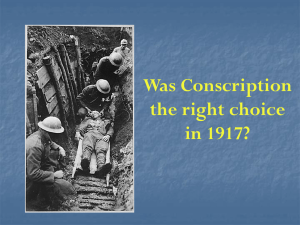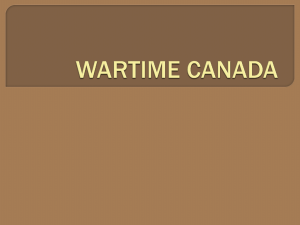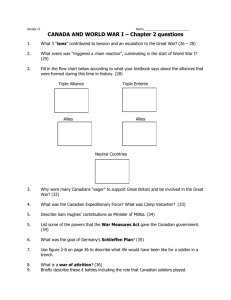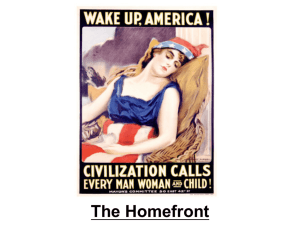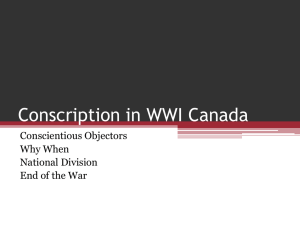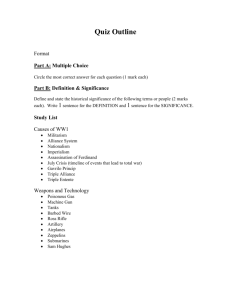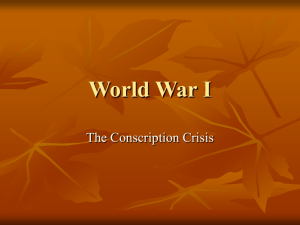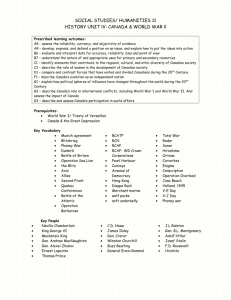History_files/War on the Homefront
advertisement
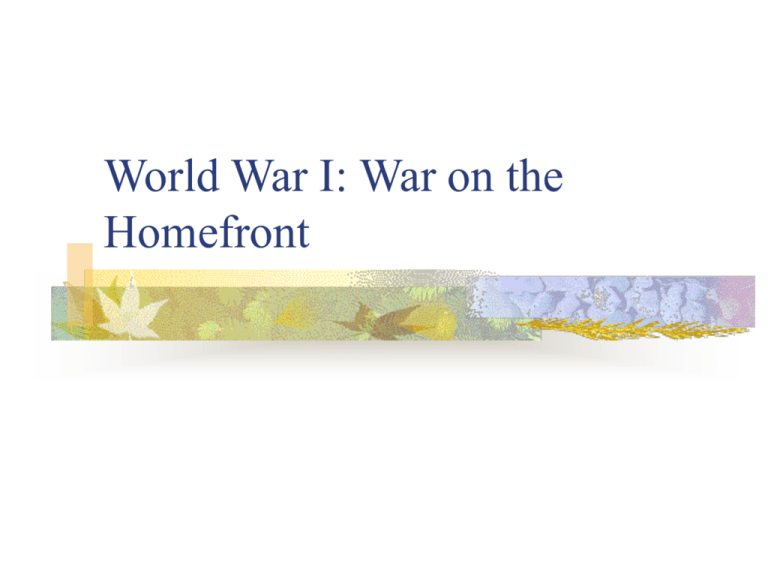
World War I: War on the Homefront The War at Home: Prime Minister Robert Borden replaced the Shell committee with the Imperial Munitions Board Munitions factories started building ships, airplanes, shells Production an exports of Canadian goods were high, but workers wages remained low Paying for the War Even though production levels were high, Canadian government could not afford to pay for the war Decided to pay its debt through 1. 2. 3. Bonds Taxes Loans Bonds, Taxes, Loans 1. 2. 3. Bonds:People were encouraged to buy Victory bonds that they could cash in, with interest, when the war as over Taxes: income tax was introduced, wealthy families paid 3% of their income, businesses paid 4% Loans: bonds and taxes were not enough, Canada had to borrow from US Women on the Homefront Women had to take new roles Organized committees to send food and letters overseas Volunteer organizations – Red Cross Contribution to the labour force Women in the Labour Force Before 1914 women were employed in low skill and low paying jobs in food and clothing industries, such as domestic servants Increase in industrial production created a great demand for labour Hired for fishing boats, running farms Suffrage Changing roles of women strengthened the campaign for suffrage (right to vote) Manitoba: suffrage rights in 1916 Alberta, Saskatchewan followed Manitoba in 1916 Ontario and BC: 1917 1918 all Canadian women won the right to vote in federal elections Closer to Home: Halifax Explosion December 6, 1917 The Mont Blanc, French vessel carrying more than 2500 t of dynamite was accidentally hit by another ship Collision caused an explosion so powerful that it devastated Halifax’s harbour killing 2000-3000 people, and devastating the harbour The Conscription Crisis In 1914, PM Borden promised there would be no conscription (mandatory enrollment into the war) By 1917, the death toll was too high, and there were not enough volunteers. So, Borden introduced the Military Service Act It allowed exemptions at first, clergy, those with essential jobs/special skills, conscientious objectors (religious beliefs) The Conscription Crisis (cont.) Majority of French-Canadaisn did nt feel that this was their fight because their ancestors had come to Canada generations before Few spoke English There was not an attempt to keep them in the same battalion Against Conscription Henri Bourassa was a Quebec nationalist, critic of conscription Farmers and industrial workers needed their sons to work, and could not afford to lose their sons to the war. 1917 Election: Khaki Election A.k.a Khaki Election PM Borden decided to call an election over conscription Passed two pieces of legislation designed to ensure his re-election: Military Voters Act: allowed men and women overseas to vote Wartime Elections Act: gave all Canadian women directly related to service men the vote Union Government Borden invited Liberals who favoured conscription to join the Conservatives to create the Union Government Union Government won the election, conscription was passed 130,000 men were enlisted, but only 25,000 soldiers reached France before the war. Propaganda Designed to persuaded people to support the war Appeared as films, magazine articles, radio programs, political speeches, and posters. Encouraged people to join the army, buy savings bonds, use less fuel, eat less meat, and support the government Often distorts the truth; portrayed German troops as the “Huns” barbarians intent on destroying the civilized world Propaganda Designed to persuaded people to support the war Appeared as films, magazine articles, radio programs, political speeches, and posters. Encouraged people to join the army, buy savings bonds, use less fuel, eat less meat, and support the government Often distorts the truth; portrayed German troops as the “Huns” barbarians intent on destroying the civilized world Propaganda Posters Instructions: Do an analysis of the displayed poster by answering the following questions When was it created? What was going on at the time of its creation? Who created it? Why was it created Who was the intended audience? What colours and symbols are used? What is the main message? What in the poster conveyed this message to you? What inferences can be made about this poster? Now it is your turn: Create your own poster: In your groups create your own propaganda poster on any aspect of WWI. Here are some ideas, but you are not limited to these ideas. Victory Bonds Joining the War Women working Your poster must include at least one symbol Posters will be marked on creativity and neatness You must also write a brief summary about your poster, explaining colour choices, symbols, etc.
